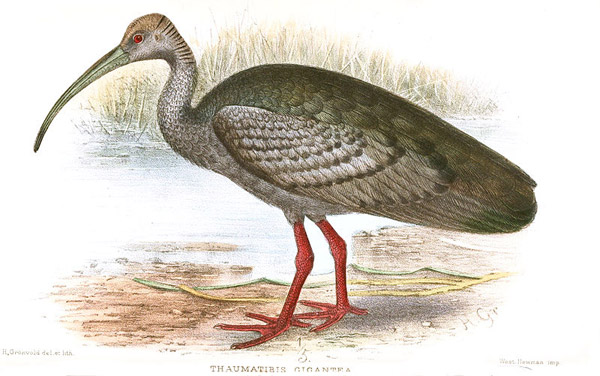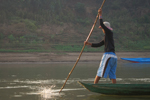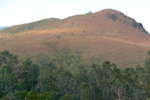Cambodia has set aside an area of forest just slightly smaller than Singapore to protect the country’s national bird: the giant ibis (Thaumatibis gigantea). Listed as Critically Endangered by the IUCN Red List, the giant ibis is down to just a few hundred birds.
Last Friday, Cambodia Prime Minister Hun Sen signed a decree protecting 66,932 hectares of Western Siem Pang forest. According to Birdlife International the forest is home to five Critically Endangered bird species in addition to the giant ibis, including the white-shouldered ibis (Pseudibis davisoni), white-rumped vulture (Gyps bengalensis), slender-billed vulture (Gyps tenuirostris), and the red-headed vultures (Sarcogyps calvus).
“We are delighted by this result and it is a crucial step to protect these species,” said Bou Vorsak, BirdLife’s Cambodia Programme Manager. “To secure the globally important populations of these Critically Endangered birds, we now must work together to start sustainable management initiatives in the adjacent area.”
Birdlife International has been lobbying for the forest’s protection for 10 years. The newly dubbed Protected Forest adds to a larger landscape of parks, making up 700,000 hectares across northern Cambodia, southern Laos, and western Vietnam.
As it’s name suggests, the giant ibis is the world’s biggest; it is also the only species found in the genus Threskiornithidae. The large bird has been pushed to the edge of extinction by vast deforestation as well as hunting and human disturbance.

Illustration of giant ibis. By: Henrik Gronvold/1911.
Related articles
Cambodian communities best placed to prevent illegal logging

(01/22/2014) A study on deforestation in Cambodia has found that forests are better protected when local communities are given the responsibility to manage them locally. Cambodia has one of the highest rates of deforestation in the world, losing 1.2 per cent each year from 2005-2010. The loss of forests due to illegal logging, commercial agriculture, and other factors can have a devastating impact on local communities, as well as contributing to global climate change. In a country beset by corruption and ineffectual state forest management, alternative models of forest protection are clearly needed.
Only suspect in Cambodian journalist’s murder acquitted
(08/29/2013) The only suspect in 2012 slaying of Hang Serei Oudom, a Cambodian environmental journalist, has been acquitted of murder by a court in Cambodia, reports the AFP.
New bird species discovered in Cambodia’s largest city
(06/26/2013) A previously unknown species of bird has been found hiding in plain sight after scientists photographed what was thought to be more abundant species at a construction site on the outskirts of Phnom Penh, Cambodia’s capitol and largest city. Subsequent analysis revealed the species to be distinct.
Featured video: a glimpse into the life of Cambodia’s Asian elephant
(05/29/2013) The Cambodian Government’s Forestry Administration has recently teamed up with the Wildlife Conservation Society (WCS) in order to peer into the daily lives of the country’s Asian Elephants (Elephas maximus). Through the use of camera traps, the organizations caught an intimate glimpse of the regular, day-to-day behavior of these animals.
Mekong region has lost a third of its forests in 30 years, may lose another third by 2030
(05/03/2013) The Greater Mekong region of Cambodia, Laos, Myanmar (Burma), Thailand and Vietnam will lose a third of its remaining forest cover by 2030 unless regional governments improve management of natural resources and transition toward a greener growth model, warns a new report issued by WWF.
The river of plenty: uncovering the secrets of the amazing Mekong

(04/23/2013) Home to giant catfish and stingrays, feeding over 60 million people, and with the largest abundance of freshwater fish in the world, the Mekong River, and its numerous tributaries, brings food, culture, and life to much of Southeast Asia. Despite this, little is known about the biodiversity and ecosystems of the Mekong, which is second only to the Amazon in terms of freshwater biodiversity. Meanwhile, the river is facing an existential crisis in the form of 77 proposed dams, while population growth, pollution, and development further imperil this understudied, but vast, ecosystem.
Poachers enlisting impoverished wildlife rangers as accomplices in elephant, rhino killing
(04/01/2013) Corruption among wildlife rangers is becoming a serious impediment in the fight against poaching, fuelled by soaring levels of cash offered by criminal poacher syndicates, senior conservation chiefs have admitted. Rangers in countries as diverse as Tanzania and Cambodia are being bribed by increasingly organised poaching gangs keen to supply ivory, rhino horn and tiger parts to meet huge consumer demand in Asia.
Cambodia loses half its seasonal wetlands in 10 years
(03/18/2013) Cambodia lost more than half of its seasonally flooded grasslands in ten years due to industrial agricultural conversion, abandonment of traditional farming, and illegal drainage, putting several endangered bird species at risk and undermining traditional livelihoods in the region, reports a new study published in the journal Conservation Biology.
Into the unknown mountains of Cambodia: rare birds, rice wine, and talk of tigers

(03/14/2013) Ringed with forested mountains forming the borders with Laos and Vietnam, the northeast corner of Cambodia has been an intriguing blank spot among my extensive travels through the country. Nestled up against this frontier is Virachey National Park, created in 1993. I began searching for a way to explore this area a couple of years ago, hoping to connect with conservation NGOs to get me into the park; no one seemed to know much about it. I learned that the area had been written off by these groups due to massive land concessions given to logging and rubber concerns. The World Bank abandoned its 8-year effort to create a management scheme for Virachey after the concessions were granted in 2007. A moratorium on the concessions is temporarily in place, but illegal logging incursions into the park continue.